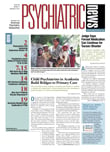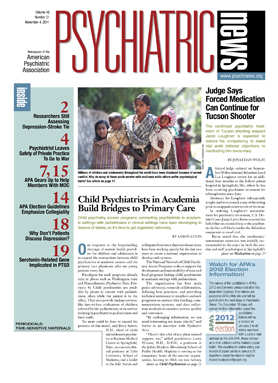If depression is a primary health concern and a common medical illness, why do so many patients avoid discussing the disorder with their primary care physicians?
This question was addressed by a new study published in the September/October
Annals of Family Medicine, which found that 43 percent of study participants "strongly endorsed" one or more proposed reasons for failing to disclose potential symptoms of depression to their physicians (see
Perceived Barriers to Care for Depression: Reasons for Nondisclosure).
According to lead study author Robert Bell, Ph.D., of the University of California, Davis, the perceived barrier to disclosure that survey respondents most identified with was concern over being prescribed an antidepressant (cited by 22.9 percent).
Despite these findings, Bell noted that 7 out of 8 study participants said they believe it is appropriate for primary care physicians to treat depression.
For the study, Bell and a team of researchers from UC Davis, the University of California, San Francisco, and the University of Rochester conducted follow-up phone interviews with 1,054 adult Californians who had participated in the 2008 California Behavioral Risk Factor Survey System. Participants both with and without a history of depression were asked to rate how strongly 11 different reasons for nondisclosure would influence their decision not to seek help from a primary care physician for depressive symptoms.
The researchers noted that while participants both with and without a history of depression cited roughly the same number of reasons as strongly affecting their hypothetical nondisclosure, there was a difference between the types of reasons identified as strongly applicable to the potential decisions of those with and without depression.
Participants with a history of depression expressed more concern about issues such as maintaining the privacy of their medical records and potentially becoming overemotional during their consultation, while those without a history of the disorder placed greater emphasis on avoiding medication and referrals for outside treatment from a psychiatrist, psychologist, social worker, or counselor.
The researchers also pointed out that individuals identified as having "moderate to severe" symptoms of depression based on results from the nine-item depression scale of the Patient Health Questionnaire associated more strongly with 10 of the 11 proposed reasons for nondisclosure than did those without depression symptoms. When the researchers looked at demographic factors, they found that women, Hispanics, and those with lower levels of education and income were more likely than other participants to identify with a greater number of potential reasons for not seeking help for depression.
Survey respondents were also asked about their general health status, beliefs on depression, and potential reaction to being diagnosed with the disorder. Among the factors associated with citing a greater number of potential barriers to disclosure were not having exposure to others with depression, having a negative perception of the disorder, and believing that one should not require outside help to quell depressive symptoms.
Additionally, the researchers observed that while having a personal history of depression was not associated with fewer perceived barriers to care, the number of potential barriers cited by participants did drop among those who had a family member or friend with the disorder.
Bell and his colleagues noted that they undertook this study as part of a larger research effort focused on developing and evaluating office-based strategies for helping patients become more comfortable in discussing depression with their doctors.
The study was supported by a grant from the National Institute of Mental Health.
"Suffering in Silence: Reasons for Not Disclosing Depression in Primary Care" is posted at <www.annfammed.org/cgi/content/full/9/5/439>.

